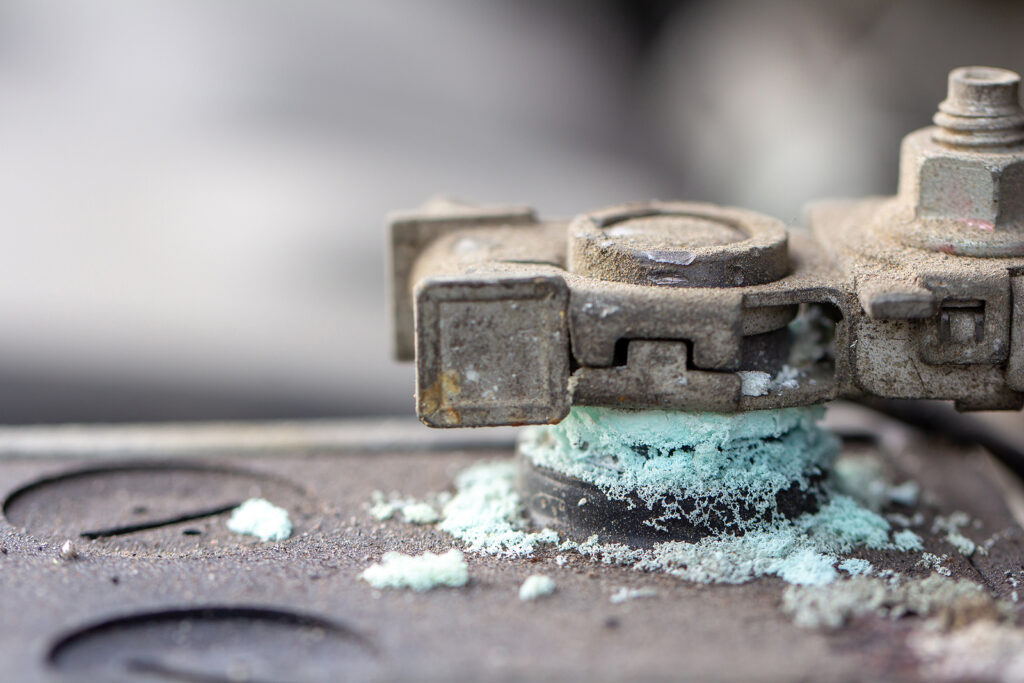As someone who’s been driving for many years, you’ve come to learn quite well the importance of your car battery. Car batteries work ongoing maintenance and routine replacement. Without proper care, car batteries will decline in both efficiency and performance. If you’ve been having problems starting or maintaining charge in your car battery, you might want to pop open the hood and take a look at its current condition. If you notice a white, scum like film accumulating around and within the battery terminals, it is an indication of battery corrosion.
Continue reading to learn more about battery corrosion, including what causes it to happen and what you can do about it.

Identifying Car Battery Corrosion
Car battery corrosion is common, especially in old car batteries. It is easy to diagnose a corroded car battery because the bright crust that forms on and around the battery terminals is hard to miss. It looks similar to dried-up toothpaste, ranging in colors from white to greenish or light blue hues. It starts white, but once, but upon exposure to moisture, it will turn to a greenish or blue color. Furthermore, corrosion crust accumulates in large masses, so once it is discovered, there is usually a large deposit to deal with.
What Causes a Car Battery to Corrode?
When a car battery is corroded, the crust impedes the electrical connection because it is a bad conductor of electricity. It causes a transient current flow, which means the electricity circles right back to the battery just keep the battery charged. Your car might turn on, but the engine will not be able to start.
The most common causes for car battery corrosion development include overcharging, gas escape, and old age. If your car battery is overcharged, the fluid within the battery terminals will expand. This will cause an overflow of liquid inside of the car battery, which can basically flood the terminals with acid. Acid causes corrosion, which in turn generates corrosion development.
Gas escape is another common reason why car batteries develop corrosion. This usually depends on the type of car battery and how it’s placed within the vehicle. Car batteries have tiny vents that allow hydrogen gas to flow through them. Sometimes these hydrogen gases can come in contact with the battery terminals or car cables, thus triggering corrosion. As already mentioned, old car batteries are more prone to car battery corrosion.
What To Do About Battery Corrosion
If your car battery is corroded, you must take a closer look to determine your compatible options. You see, just because a car battery is corroded does not mean that it is junked. It is possible to clean the corrosion off of a car battery, so long as you have the right materials and use the right methods. If your battery is new, you should try cleaning the corrosion before replacing the battery altogether. If your battery is old, or approaching the 4 to 5 year mark, battery replacement is the best option for you. Sell your used car battery to a Louisville scrapyard for cash on the spot!
To clean the corrosion off of a car battery, you will need baking soda, petroleum jelly, anti-corrosion pads, a stiff bristle brush or wire brush, safety goggles, work gloves, clean water, and rags. Always disconnect your battery cables starting with the negative (-) cable first before you begin cleaning your car battery. Combine the baking soda, usually around a teaspoon, with the petroleum jelly to create a paste. Apply the paste all over the corrosion and scrub away with your anti-corrosion pads or stiff bristle brush. Thoroughly rinse the car battery when you are finished, then allow it to dry completely.
Do you have some junk auto parts that you’d like to sell for cash on the spot? Contact GC’s Junk Cars at 502-804-5605 to sell used car parts in Louisville, Kentucky. We pay cash for all scrap metal and automotive parts.
Related Posts:
How to Prevent Major Engine Repair or Replacement
The Most Expensive Auto Repairs That Can Total Your Car
Is My Car Totaled if the Airbag Deploys?
